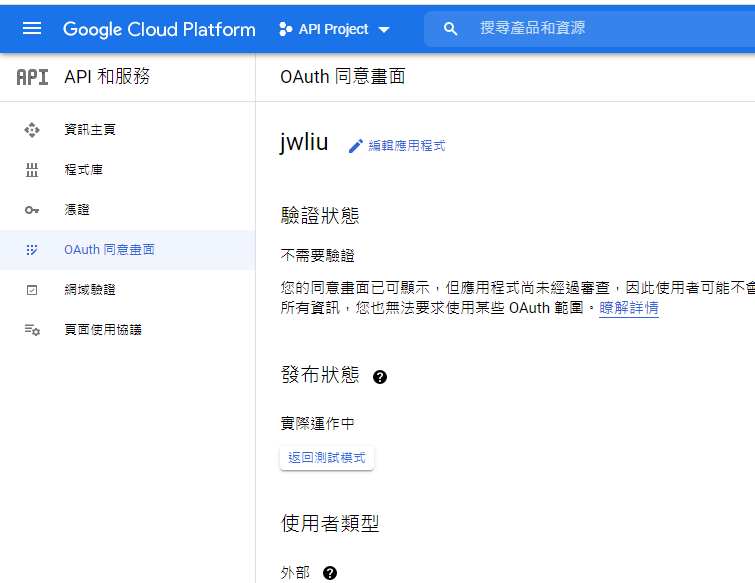公司有很多活動需要更新到行事曆去,隨者越來越多,用手動實在是太不自動化拉,我就開始研究API部分,過程有點繁瑣不過串接API上是簡單的 , 使用PHP語言與Laravel 架構 。
首先要先到 https://console.cloud.google.com/ 要創立一個專案與設定好OAuth 應用程式,產生後就會有Key 跟Secret 後續要用到 。

複製ID 與Secret 貼到下方還有設定好redirectURL ,轉頁的URL與開啟登入頁這個頁面是同一個,下方注意到 access_type 設定為offline 讓這個token 一直都有效,OAuth 做好自動轉回這頁,頁面上就會看到Token了。
/* Google App Client Id */
define('CLIENT_ID', 'xxxxx');
define('CLIENT_SECRET', 'xxxxx');
define('CLIENT_REDIRECT_URL', 'xxxxx');
$login_url = 'https://accounts.google.com/o/oauth2/auth?scope=' . urlencode('https://www.googleapis.com/auth/calendar') . '&redirect_uri=' . urlencode(CLIENT_REDIRECT_URL) . '&response_type=code&client_id=' . CLIENT_ID . '&access_type=offline';
echo "<a href='" . $login_url . "' target='_blank' >Login</a>";
$code = Input::get('code');
if (isset($code)) {
try {
// Get the access token
$data = GoogleCalendarApi::GetAccessToken(CLIENT_ID, CLIENT_REDIRECT_URL, CLIENT_SECRET, $code);
echo $data['access_token'];
exit();
} catch (Exception $e) {
echo $e->getMessage();
exit();
}
}以下是會呼叫到的程式庫
<?php
class GoogleCalendarApi
{
public static function GetAccessToken($client_id, $redirect_uri, $client_secret, $code) {
$url = 'https://accounts.google.com/o/oauth2/token';
$curlPost = 'client_id=' . $client_id . '&redirect_uri=' . $redirect_uri . '&client_secret=' . $client_secret . '&code='. $code . '&grant_type=authorization_code';
$ch = curl_init();
curl_setopt($ch, CURLOPT_URL, $url);
curl_setopt($ch, CURLOPT_RETURNTRANSFER, 1);
curl_setopt($ch, CURLOPT_POST, 1);
curl_setopt($ch, CURLOPT_SSL_VERIFYPEER, FALSE);
curl_setopt($ch, CURLOPT_POSTFIELDS, $curlPost);
$data = json_decode(curl_exec($ch), true);
$http_code = curl_getinfo($ch,CURLINFO_HTTP_CODE);
if($http_code != 200)
throw new Exception('Error : Failed to receieve access token');
return $data;
}
public static function GetUserCalendarTimezone($access_token) {
$url_settings = 'https://www.googleapis.com/calendar/v3/users/me/settings/timezone';
$ch = curl_init();
curl_setopt($ch, CURLOPT_URL, $url_settings);
curl_setopt($ch, CURLOPT_RETURNTRANSFER, 1);
curl_setopt($ch, CURLOPT_HTTPHEADER, array('Authorization: Bearer '. $access_token));
curl_setopt($ch, CURLOPT_SSL_VERIFYPEER, FALSE);
$data = json_decode(curl_exec($ch), true); //echo '<pre>';print_r($data);echo '</pre>';
$http_code = curl_getinfo($ch,CURLINFO_HTTP_CODE);
if($http_code != 200)
throw new Exception('Error : Failed to get timezone');
return $data['value'];
}
public static function GetCalendarsList($access_token) {
$url_parameters = array();
$url_parameters['fields'] = 'items(id,summary,timeZone)';
$url_parameters['minAccessRole'] = 'owner';
$url_calendars = 'https://www.googleapis.com/calendar/v3/users/me/calendarList?'. http_build_query($url_parameters);
$ch = curl_init();
curl_setopt($ch, CURLOPT_URL, $url_calendars);
curl_setopt($ch, CURLOPT_RETURNTRANSFER, 1);
curl_setopt($ch, CURLOPT_HTTPHEADER, array('Authorization: Bearer '. $access_token));
curl_setopt($ch, CURLOPT_SSL_VERIFYPEER, FALSE);
$data = json_decode(curl_exec($ch), true); //echo '<pre>';print_r($data);echo '</pre>';
$http_code = curl_getinfo($ch,CURLINFO_HTTP_CODE);
if($http_code != 200)
throw new Exception('Error : Failed to get calendars list');
return $data['items'];
}
public static function CreateCalendarEvent($calendar_id,$attendees,$location, $description, $summary, $all_day, $event_time, $event_timezone, $access_token) {
$url_events = 'https://www.googleapis.com/calendar/v3/calendars/' . $calendar_id . '/events';
$curlPost = array('summary' => $summary);
if($all_day == 1) {
$curlPost['start'] = array('date' => $event_time['event_date']);
$curlPost['end'] = array('date' => $event_time['event_date']);
}
else {
$curlPost['start'] = array('dateTime' => $event_time['start_time'], 'timeZone' => $event_timezone);
$curlPost['end'] = array('dateTime' => $event_time['end_time'], 'timeZone' => $event_timezone);
}
$curlPost['attendees'] = $attendees;
$curlPost['location'] = $location;
$curlPost['description'] = $description;
$curlPost['sendUpdates'] = "all";
$ch = curl_init();
curl_setopt($ch, CURLOPT_URL, $url_events);
curl_setopt($ch, CURLOPT_RETURNTRANSFER, 1);
curl_setopt($ch, CURLOPT_POST, 1);
curl_setopt($ch, CURLOPT_SSL_VERIFYPEER, FALSE);
curl_setopt($ch, CURLOPT_HTTPHEADER, array('Authorization: Bearer '. $access_token, 'Content-Type: application/json'));
curl_setopt($ch, CURLOPT_POSTFIELDS, json_encode($curlPost));
$data = json_decode(curl_exec($ch), true);
$http_code = curl_getinfo($ch,CURLINFO_HTTP_CODE);
if($http_code != 200) {
return $data;
throw new Exception('Error : Failed to create event');
}
return $data['id'];
}
public static function getCalendarEvent($calendar_id, $event_id, $access_token) {
$url_events = 'https://www.googleapis.com/calendar/v3/calendars/' . $calendar_id . '/events/'.$event_id;
$ch = curl_init();
curl_setopt($ch, CURLOPT_URL, $url_events);
curl_setopt($ch, CURLOPT_RETURNTRANSFER, 1);
curl_setopt($ch, CURLOPT_HTTPHEADER, array('Authorization: Bearer '. $access_token));
curl_setopt($ch, CURLOPT_SSL_VERIFYPEER, FALSE);
$data = json_decode(curl_exec($ch), true);
$http_code = curl_getinfo($ch,CURLINFO_HTTP_CODE);
if($http_code != 200) {
return $data;
throw new Exception('Error : Failed to create event');
}
return $data;
}
public static function updateCalendarEvent($calendar_id,$event_id,$attendees,$location, $description,$summary, $all_day, $event_time, $event_timezone, $access_token) {
$url_events = 'https://www.googleapis.com/calendar/v3/calendars/' . $calendar_id . '/events/'.$event_id;
$curlPost = array('summary' => $summary);
if($all_day == 1) {
$curlPost['start'] = array('date' => $event_time['event_date']);
$curlPost['end'] = array('date' => $event_time['event_date']);
}
else {
$curlPost['start'] = array('dateTime' => $event_time['start_time'], 'timeZone' => $event_timezone);
$curlPost['end'] = array('dateTime' => $event_time['end_time'], 'timeZone' => $event_timezone);
}
$curlPost['attendees'] = $attendees;
$curlPost['location'] = $location;
$curlPost['description'] = $description;
$curlPost['sendUpdates'] = "all";
$ch = curl_init();
curl_setopt($ch, CURLOPT_URL, $url_events);
curl_setopt($ch, CURLOPT_RETURNTRANSFER, 1);
curl_setopt($ch, CURLOPT_CUSTOMREQUEST, "PUT");
curl_setopt($ch, CURLOPT_SSL_VERIFYPEER, FALSE);
curl_setopt($ch, CURLOPT_HTTPHEADER, array('Authorization: Bearer '. $access_token, 'Content-Type: application/json'));
curl_setopt($ch, CURLOPT_POSTFIELDS, json_encode($curlPost));
$data = json_decode(curl_exec($ch), true);
$http_code = curl_getinfo($ch,CURLINFO_HTTP_CODE);
if($http_code != 200) {
return $data;
throw new Exception('Error : Failed to create event');
}
return $data['id'];
}
}
?>新增一個事件的做法
$access_token = "xxxx";
$calendar_id = "xxxx";
$summary = "test event from api";
$event_timezone = "Asia/Taipei";
$event_time['start_time'] = "2021-07-27T19:00:00+08:00";
$event_time['end_time'] = "2021-07-27T20:00:00+08:00";
$all_day = 0;
$attendees = array('email' => "[email protected]");
$location = "zoom";
$description = " ";
$list = GoogleCalendarApi::CreateCalendarEvent($calendar_id, $attendees, $location, $description , $summary, $all_day, $event_time, $event_timezone, $access_token);
print_r($list);其他用法可以參考程式庫,目前沒有刪除功能,有需要的人可以試試自己來寫 。
參考google API說明
